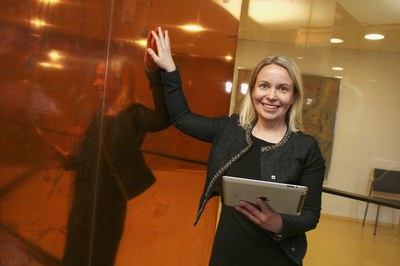Technology changing teacher’s role (12th February 2015)
Along with technological development, traditional teaching methods have been challenged by various technologically enhanced teaching and learning methods. This trend has received mixed reactions: On the one hand it is feared that these new technologies will replace teachers altogether. On the other hand, the expectations towards technology can also be over-optimistic; that it will solve all the problems of learning
A recent Finnish-Swiss-Belgian study provides new information about the changing role of the teacher in technology-supported learning environments. According to the research findings, the use of technology changes the role of the teacher from a traditional knowledge provider rather into a facilitator guiding the students’ learning processes and engaging in joint problem-solving with the students. In addition, technology offers a range of new types of learning possibilities.
–With the help of tablets and smartphones, new ways have been discovered which support the cooperation between education and the world of work. For example, videos recorded at the workplace can be used as a learning resource at school, says adjunct professor Raija Hämäläinen from the Finnish Institute for Educational Research.
According to Hämäläinen, smartphones also open up new possibilities for such pedagogical practices where students have a more active role than before.
– With smart phones the students can, for instance, write scripts and make videos that illustrate the matters to be learnt.
Diverse utilisation of devices is a challenge
At its best, successful utilisation of technology provides opportunities for more interactive learning and teaching. This, of course, poses a challenge for teachers’ professional development and teacher training.
– From the viewpoint of the development of future learning environments it is essential how well we will succeed in utilising new technologies, such as tablets, smartphones, and games in support for learning, Hämäläinen summarises.
The target group of the study consisted of first and second year vocational school students and their teachers from different fields. The main focus of the study was on the interaction between the teacher and students in various technology supported learning environments.
The study was funded by the Academy of Finland.
Further information:
- Adjunct Professor Raija Hämäläinen, Finnish Institute for Educational Research, raija.h.hamalainen@jyu.fi, +358 40 744 2611
Article:
- Hämäläinen, R. & Cattaneo, A. (2015, accepted for publication). New TEL Environments for Vocational Education - Teacher's Instructional Perspective. Vocations and Learning: Studies in vocational and professional education. http://link.springer.com/article/10.1007/s12186-015-9128-1

